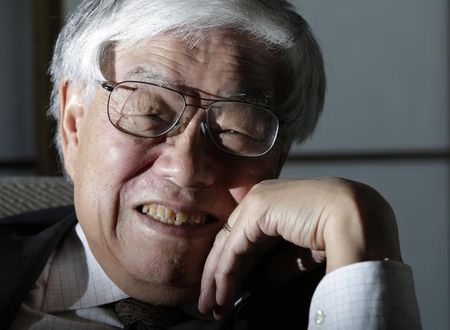By Kaori Kaneko and Sumio Ito
TOKYO (Reuters) - Prime Minister Shinzo Abe's economic policies are working well but the blow to the economy from an April sales tax hike has been bigger than expected, a key adviser to Abe said on Friday.
Koichi Hamada, professor emeritus of economics at Yale University, also said the overall economy would benefit if the yen weakened to 120 yen per dollar but added that steps were needed to reduce any negative impact on consumers.
Abe dissolved parliament's lower house on Friday for a snap election expected on Dec. 14, seeking a fresh mandate for his struggling "Abenomics" revival strategy just two years after he returned to power promising that "Japan is Back".
"It is true the economy is faltering because of the sales tax hike to 8 percent in April," Hamada told Reuters.
Abenomics' first arrow of monetary policy and the second, fiscal spending to generate demand, have worked well, he said.
"The negative impact from the tax hike, which works in the opposite direction to Abenomics, has been a little stronger than expected. In that sense, it is natural for the government to postpone the (second) tax hike."
A second tax increase, to 10 percent, had been slated for October 2015, but Abe said this week he would postpone the move for 18 months after the economy slipped into recession.
A general election does not need to be held until late 2016 and surveys show around two-thirds of voters are wondering why Abe has called for one.
"The Japanese people will be able to judge Abenomics after having experienced it. The previous election was one before they experienced Abenomics. I think there is certain meaning to asking the public about it," Hamada said.
Asked if the yen weakening to 120 yen per dollar would be positive for the overall economy, Hamada said: "Yes, I think so." But he added the government may have to offer assistance to cushion the blow on those most vulnerable to rising prices.
The yen rose sharply against the dollar on Friday after Japanese Finance Minister Taro Aso said the currency's fall over the past week was too rapid, in one of the strongest warnings against a weak yen since Japan started its aggressive monetary stimulus two years ago. [FRX/]
The yen is hovering around 117.80 yen against the dollar, after having fallen to seven-year lows around 119 yen.
CORPORATE TAX
The Bank of Japan shocked global financial markets late last month by expanding its massive stimulus spending in a stark admission that economic growth and inflation have not picked up as much as expected after the sales tax hike.
Hamada described the BOJ's stimulus expansion on Oct. 31 as "very good", as it contained an element of surprise and affirmed the central bank's determination to achieve its price goal.
But he added the BOJ's inflation goal of 2 percent should not be a rigid target by which to measure success in the next fiscal year.
"Considering the current oil prices and the employment situation, consumer inflation around 1.5 percent may be acceptable," he said.
The government plans to lower the corporate tax rate below 30 percent in stages to spur foreign investment. Japan's corporate tax rate at more than 35 percent is among the highest in the industrialised world.

"Considering the corporate tax rate of other nations which compete with Japan, it is important for the nation to cut the rate closer to 20 percent and be a player for tax competition," Hamada said.
(Reporting by Kaori Kaneko and Sumio Ito; Editing by Kim Coghill and Jacqueline Wong)